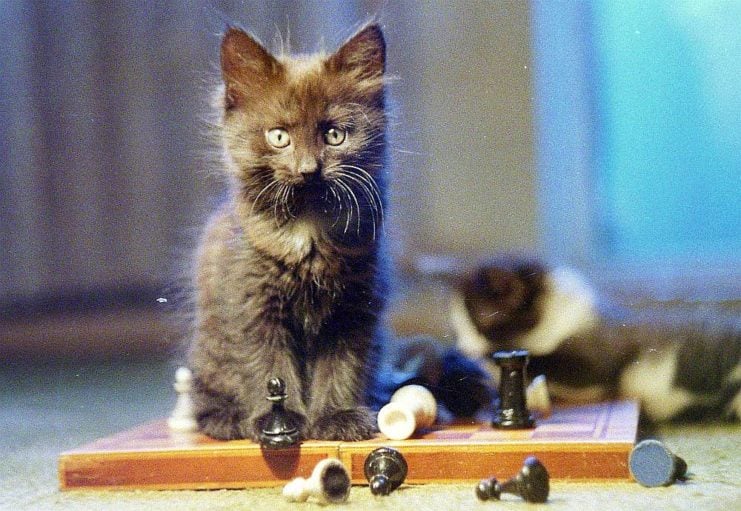Who is more intelligent, cats or dogs? Most people will say, without hesitation, that dogs are. They are easier to train, help defuse bombs, search for victims, and aid disabled people with their household chores. Cats can help you remember to feed them.

If we need to answer in one word, then we’d say yes, cats are smart. They can follow human gestures, manipulate human behavior through their social signals, and do rather well in simple object counting (they can teel the difference between many and few dots). House cats also appear to grasp rather well where disappearing objects go, discriminate different time intervals, recognize their owner’s voice and show fine skill at orienteering in the environment.
Some of you, however, may argue that excelling at these tasks may not be enough to call cats intelligent since cats show mixed results in intelligence tests. Yet, here comes another question: How do we measure intelligence?
What does it mean to be intelligent?
For example, if we gave a human IQ test to cats, they would fail miserably. Just like would fail dogs and crows, animals that are considered to be among the smartest non-humans. That does not mean crows are not intelligent; that only means that IQ test is not an appropriate method to measure smartness of animals.
In his book “Are we smart enough to tell how smart animals are” Frans de Waal wrote that we humans are too focused on smartness when we measure animal intelligence. He wrote, “What a bizarre animal we are that the only question we can ask in relation to our place in nature is ‘Mirror, mirror on the wall, who is the smartest of them all?’ ” There is a slight hint to the mirror test — a standard method for testing animals’ self-awareness.
The notion is, if an animal can recognize itself in the mirror, it has a sense of self. A rather vague measure of intelligence, as well. Cats and dogs fail the mirror test. However, does it mean that cats and dogs are not self-aware? Dogs, for example, are scent-oriented, and they may not perform well in visual tasks. Cats are also scent-oriented, sure, but they are also known to care very little about things.
Can we judge a cat by tasks dogs do well?
Another reason why we can tell little about cat intelligence is that they are studied little. Early experiments on animal intelligence included cats a lot. Cats showed excellent results in escaping entrapment, and many cat owners will tell that cats can get in and out of rooms and food containers in creative ways.
Unfortunately, later animal intelligence tests switched to dogs since they are easy to train. And even when cats were tested, scientists used methods adapted from dog research.
The thing is, when you test the intelligence of an animal, you must know your species and use species-appropriate tests. You know what happens when you judge a fish by its ability to climb trees. The same goes if you judge a cat by its ability to do things it does not care about.
To test how smart animals are, you should first understand the ins and outs of their ecology and behavior. Of their ability to survive in nature and what helps them to be better at things they do. Cats, on that note, are opportunistic hunters and tasks that they must excel at are understanding their environment, skills in prey stalking, prey location and similar.
Thus far, scientists have done a poor job of finding suitable tasks that are appropriate for testing cat intelligence. Yet, does that mean that cats are not smart? Maybe scientists aren’t?
John Bradshaw, an anthrozoologist who focuses on cat and dog research, in his book “Cat Sense”, wrote that “cats, with their enigmatic reputation, may still be hiding the true extent of their brainpower.” At the same time, things that we have seen in cat intelligence research, let us be optimistic and state that cats are intelligent and smart.
